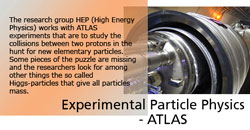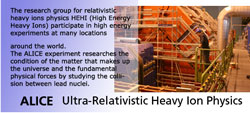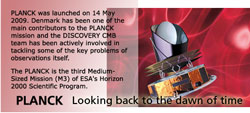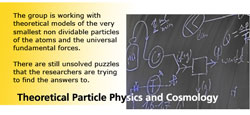
The Discovery center was a "Centre of Excellence" established by the Danish National Research Foundation (DNRF) 2010-2019 (grant expired 31.12.2019)
The center began January 1st, 2010 at the Niels Bohr Institute, University of Copenhagen. Discovery is initially funded by the DNRF for an initial duration of five years.
The center was granted a second 5-year period starting January 1, 2015 and the research areas now includes the Astroparticle Physics group with access to The IceCube Neutrino Observatory - the world's largest and most sensitive ‘telescope' for high energy neutrinos.
Four strong groups join forces:
The activities in the center are focused on the discoveries arising from four closely collaborating groups that are each intensely involved in experiments and the theory of particle physics and cosmology. Central in the joint work is the remarkable new connection between physics at the smallest of scales (as explored at the Large Hadron Collider at CERN) and cosmology at the largest scales measurable in the Universe (as explored by the center's participation in the Planck satellite project). For details on the organization of the center and the people involved, please see the organization page. The participating physics groups of the center are:
 • Experimental Particle Physics
• Experimental Particle Physics
This group participates in the ATLAS experiment at the Large Hadron Collider. On the hardware side the group is involved in the Transition Radiation Tracker as well as in the Trigger-DAQ and on the physics side on final states containing tau-leptons or electrons.
 • Experimental Heavy Ion Physics
• Experimental Heavy Ion Physics
This group participates in the ALICE experiment at the Large Hadron Collider where it is responsible for a laser calibration system for the Time Projection Chamber and for the Forward Multiplicity Detector.
• The Planck Project The cosmology group participates in the Planck satellite mission science team, and Denmark has been one of the main contributors to the PLANCK mission and the DISCOVERY CMB team.
The cosmology group participates in the Planck satellite mission science team, and Denmark has been one of the main contributors to the PLANCK mission and the DISCOVERY CMB team.
• Theoretical Particle Physics and Cosmology The theory group explores new techniques for calculating amplitudes and probability densities for complex processes involving the strong interaction.
The theory group explores new techniques for calculating amplitudes and probability densities for complex processes involving the strong interaction.
